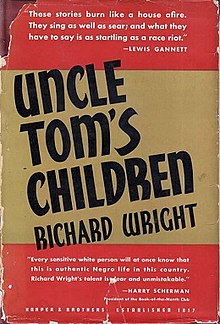Uncle Tom's Children

First edition cover with quote from
Harry Scherman |
|
| Author | Richard Wright |
|---|---|
| Country | United States |
| Language | English |
| Genre | Novella |
| Publisher | Harper & Brothers |
|
Publication date
|
1938 and reissued 1940. |
| Pages | 317 |
Uncle Tom's Children is a collection of novellas and the first book published by African-American author Richard Wright, who went on to write Native Son (1940), Black Boy (1945), and The Outsider (1953). When it was first published in 1938, Uncle Tom's Children included only four novellas: "Big Boy Leaves Home," "Down by the Riverside," "Long Black Song," and "Fire and Cloud." "The Ethics of Living Jim Crow" and "Bright and Morning Star," which are now the first and final pieces, respectively, were added when the book was republished in 1940. The book's title is derived from Harriet Beecher Stowe's Uncle Tom's Cabin, an anti-slavery novel published in 1852.
"The Ethics of Living Jim Crow" follows Richard Wright's own experiences growing up in the Jim Crow era. The essay begins with Wright's first encounter with racism as a child, when his attempt to play a war game with white children turns violent, and ends with a scolding from his mother, blaming him for the incident. The rest of the essay follows his experiences as a Black man in the South through his adolescence and adulthood. He describes his experiences with racism at his first job, at an optical company where his white coworkers increasingly bully and threaten him as punishment for wanting to learn skills that could allow him to advance, ultimately forcing him out. Wright describes the continuation of his "Jim Crow education" as he moves from place to place, witnessing violence against a Black woman that police officers punish her for, facing attacks on his own body from white youths, and working as a bell-boy in a hotel where white men have exploitative sex with Black maids, but where sex with a white prostitute means castration or death for a Black man. Wright's essay ends with a discussion of the complicated world view Black people must adopt in order to survive during Jim Crow, and asking the question "How do Negroes feel about the way they have to live?"
"Big Boy Leaves Home" is the story of Big Boy, a young Black boy whose youthful excursion goes horribly wrong. Big Boy and his friends, Bobo, Lester, and Buck decide to go to the local swimming hole, which is owned by a white man who does not allow Black people to swim there. Despite their initial reservations, they strip naked and proceed to play in the water. When a white woman comes upon the boys, they are unable to get their clothes back without being seen, and the woman panics, thinking she is being attacked. She calls for her husband Jim, who appears and shoots Lester and Buck, killing them. After a brief struggle between Big Boy and Jim, Big Boy takes control of the rifle and shoots Jim. Terrified, Big Boy and Bobo gather their clothes and flee the scene. The boys agree to run back to their homes apart, desperately trying to escape the imminent threat lynching. Once Big Boy arrives at home, he relays the story to his mother and father, who gather members of their community in an attempt to save their son. Big Boy is sent off with some food to hide, lying in wait for an acquaintance of the family with a truck that will be able to take him away from the gathering mob. From his hiding place in the hills, he overhears white men discussing their search for himself and Bobo. Eventually, Bobo is captured by the mob, who tar and feather him as Big Boy is forced to listen. In the morning, Will, the truck driver finds Big Boy and they drive off, with Big Boy's future uncertain.
...
Wikipedia
